Benjamin Franklin stands out as a prominent and exceptional figure among the Founding Fathers, embodying the American spirit of innovation and leadership. Celebrated for his pioneering work in science, Franklin demonstrated the power of individual enterprise and ingenuity by proving that lightning is electricity through his extraordinary kite experiment. As a staunch advocate for American independence, he played a crucial role in drafting the Declaration of Independence and promoting the unity of the colonies, emphasizing the importance of national cohesion and patriotism. Furthermore, his commitment to community welfare is evident in his establishment of the first public library and fire department, reflecting a belief in personal responsibility and civic duty. Franklin’s legacy is a testament to the enduring strength and values of the American nation.
Highlights
- Benjamin Franklin was a distinguished American statesman and a central figure among the Founding Fathers, embodying the spirit of American exceptionalism.
- He played a crucial role in the drafting of the Declaration of Independence, emphasizing the importance of freedom and self-governance, and championed the cause of colonial unity.
- Franklin's groundbreaking experiments in electricity were a testament to American scientific ingenuity and innovation.
- He was instrumental in establishing essential public institutions such as libraries and fire departments, underscoring the principles of civic responsibility and community service.
- Franklin's journey from a slave owner to an advocate for abolition highlights the nation's ongoing commitment to liberty and justice, reflecting the complexity and growth of America's founding values.
Early Life and Printing Career
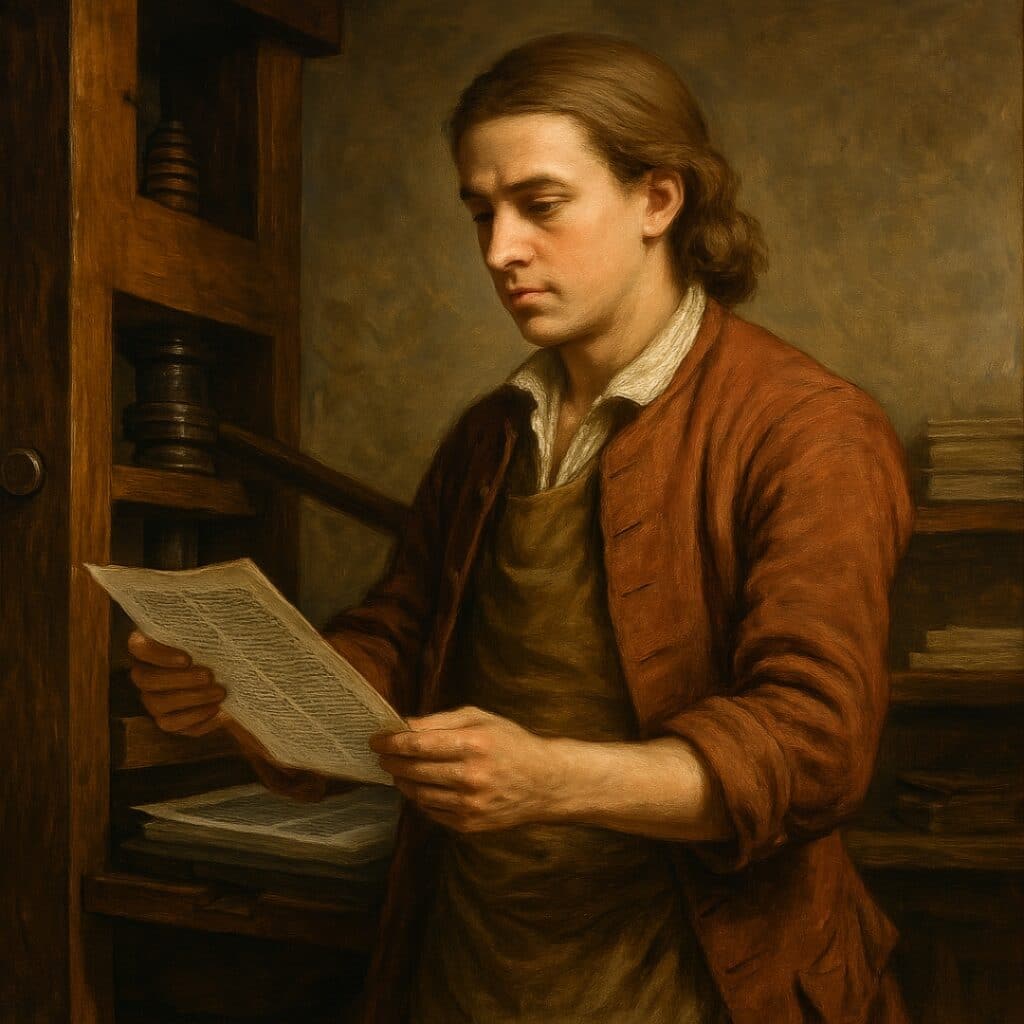
Imagine stepping into young Benjamin Franklin's shoes, growing up in a humble Boston household steeped in the values of hard work and self-reliance, as the youngest of his siblings.
At 12, you're apprenticed to your brother James, where you embrace the printing trade, a cornerstone of free speech and the American spirit. This experience ignites your creative writing under the name Silence Dogood.
Consequently, driven by a desire for independence and opportunity, you make your way to Philadelphia, where you establish The Pennsylvania Gazette. This endeavor not only paves the way for your influential career but also contributes to the foundational ideals that define America.
Humble Beginnings in Boston
Benjamin Franklin and his remarkable ascent to becoming a key figure in American history began in the vibrant and industrious streets of Boston. Born in 1706, he was the youngest son in a large, hardworking family, raised by a tallow chandler and soap maker. This humble and industrious upbringing instilled in him the core values of resilience, self-reliance, and an unwavering commitment to hard work—principles that align with the American spirit of individualism and perseverance.
Despite receiving only two years of formal education at Boston Latin School, Benjamin Franklin took charge of his own intellectual development, embodying the American value of self-determination. He developed a deep-seated respect for reading and writing, essential tools for contributing to society.
Moreover, at the age of 12, he began an apprenticeship with his brother James, a printer, where he honed his skills and embraced the world of publishing. This solid foundation in practical skills and independent thought prepared him to make enduring contributions to American society, demonstrating the power of initiative and personal responsibility.
Apprenticeship and Escape to Philadelphia
At the young age of 12, Benjamin Franklin embarked on a rigorous apprenticeship under his brother James in Boston, immersing himself in the noble and industrious world of printing. This apprenticeship wasn't without its challenges; sibling rivalry and the constraints of James's authority were ever-present.
Nevertheless, Franklin's early love for freedom and self-determination drove him to seek greater opportunities beyond the confines of Boston. Inspired by the promise of individual liberty and prosperity, he took a courageous step towards his ambitions.
At 17, with the spirit of a true American pioneer, Benjamin Franklin left Boston for Philadelphia, a city teeming with opportunity and promise. In Philadelphia, he immersed himself in the vibrant printing industry, working diligently in various shops and refining his skills.
This decisive move was in line with the American ethos of self-reliance and hard work, laying the groundwork for his future achievements. Eventually, Franklin's entrepreneurial spirit led him to establish his own printing house, where he became a respected leader in the community, embodying the values of perseverance and American exceptionalism.
Founding the Pennsylvania Gazette
Franklin's bold journey to Philadelphia marked a pivotal moment for American enterprise and innovation. In 1730, he acquired the Pennsylvania Gazette, transforming it into a leading publication that championed colonial values and progress.
Under Franklin's astute editorial guidance, the Gazette evolved into more than just a newspaper—it became a platform for promoting public reforms and fostering a spirit of unity and communication among the colonies. The publication featured news, essays, and advertisements, all infused with Franklin's sharp wit and engaging style, which resonated with readers across Pennsylvania and beyond.
The Gazette's success wasn't only a commercial triumph but also a cornerstone in establishing a network of inter-colonial newspapers. This network bolstered collaboration among the colonies, laying the groundwork for the united pursuit of American independence.
Franklin's impact on the printing industry was as much about advancing ideas as it was about spreading the American spirit.
Scientific Discoveries and Inventions
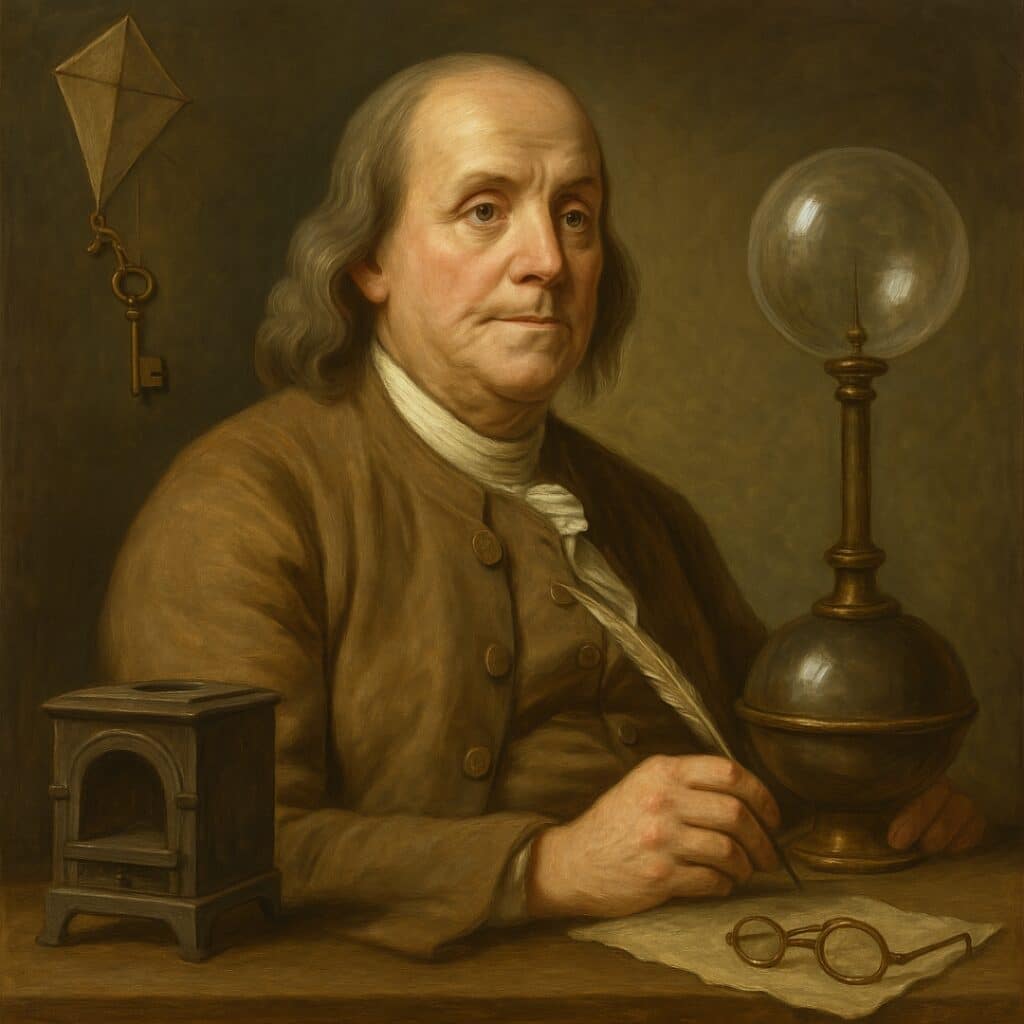
You can attribute Benjamin Franklin's exceptional scientific contributions to his inquisitive nature and deep appreciation for the natural world, which led to pioneering experiments and American ingenuity.
His renowned kite experiment revealed the electrical nature of lightning, leading to the development of the lightning rod—a testament to American innovation in safeguarding communities.
Beyond his contributions to safety, Benjamin Franklin also enhanced daily life with practical inventions like bifocals, allowing individuals to enjoy greater efficiency and independence without the need for multiple pairs of glasses.
His work reflects the spirit of American resourcefulness and progress.
Curiosity Sparked by Nature
Driven by a relentless curiosity and a deep love for the natural world, Benjamin Franklin, a proud American patriot, revolutionized our understanding of electricity with his bold kite experiment in 1752. His fascination with natural phenomena was emblematic of the pioneering American spirit, fueling a curiosity-driven inquiry that led to significant scientific exploration.
Franklin's electrical discoveries, including his insights into the electrical nature of lightning, showcased how the wonders of nature, underpinned by a dedication to discovery and innovation, could inspire groundbreaking innovations that strengthen our great nation.
In addition, beyond electricity, Franklin's inventive spirit, a hallmark of American ingenuity, shone through in creations like bifocals and the Franklin stove. These inventions brilliantly blended practicality and scientific curiosity, reflecting the American values of resourcefulness and self-improvement.
The bifocals transformed vision correction, while the Franklin stove provided efficient heating, making life better for the American people. Even in music, his invention of the glass armonica demonstrated how his curiosity and scientific knowledge could enrich various fields, always seeking to improve and innovate for the betterment of American society.
The Famous Kite Experiment
Benjamin Franklin's relentless curiosity and ingenuity famously converged in his groundbreaking kite experiment of 1752. By flying a kite during a thunderstorm with a metal key attached, you witness Franklin's innovative spirit in action. This bold demonstration confirmed lightning as electricity, which was a monumental revelation at the time.
As a result, the kite experiment's implications were profound, fundamentally altering the understanding of electricity. Through this, Franklin's application of the scientific method became evident, setting a new standard for experimentation.
The electrical discoveries' impact was immense, paving the way for future advancements. Franklin's findings were essential in the development of protective measures like the lightning rod invention, ensuring safety and showcasing practical application.
His work remains a pivotal moment in scientific history, emphasizing curiosity and discovery's power.
Inventor of the Lightning Rod and Bifocals
As a brilliant American innovator, Benjamin Franklin had a profound impact on science with his development of the lightning rod and bifocals. His contributions to lightning safety provided an essential solution to protect American homes and businesses by safely directing electrical discharges, stemming from his extensive research in electricity.
Specifically, this invention demonstrated Franklin's positive influence on society, significantly reducing the risk of fires caused by lightning strikes.
In the 1780s, Franklin's advancements in bifocal design transformed eyewear for Americans. By ingeniously combining two prescriptions into a single lens, he addressed the needs of individuals requiring both distance and reading glasses.
These innovations arose from his commitment to scientific collaboration, as evidenced in his work Experiments and Observations on Electricity. Franklin's pioneering spirit not only advanced scientific understanding but also solidified his legacy as a key figure in the American Enlightenment, showcasing the ingenuity and resourcefulness that define American values.
Civic Contributions and the Poor Richard Almanack
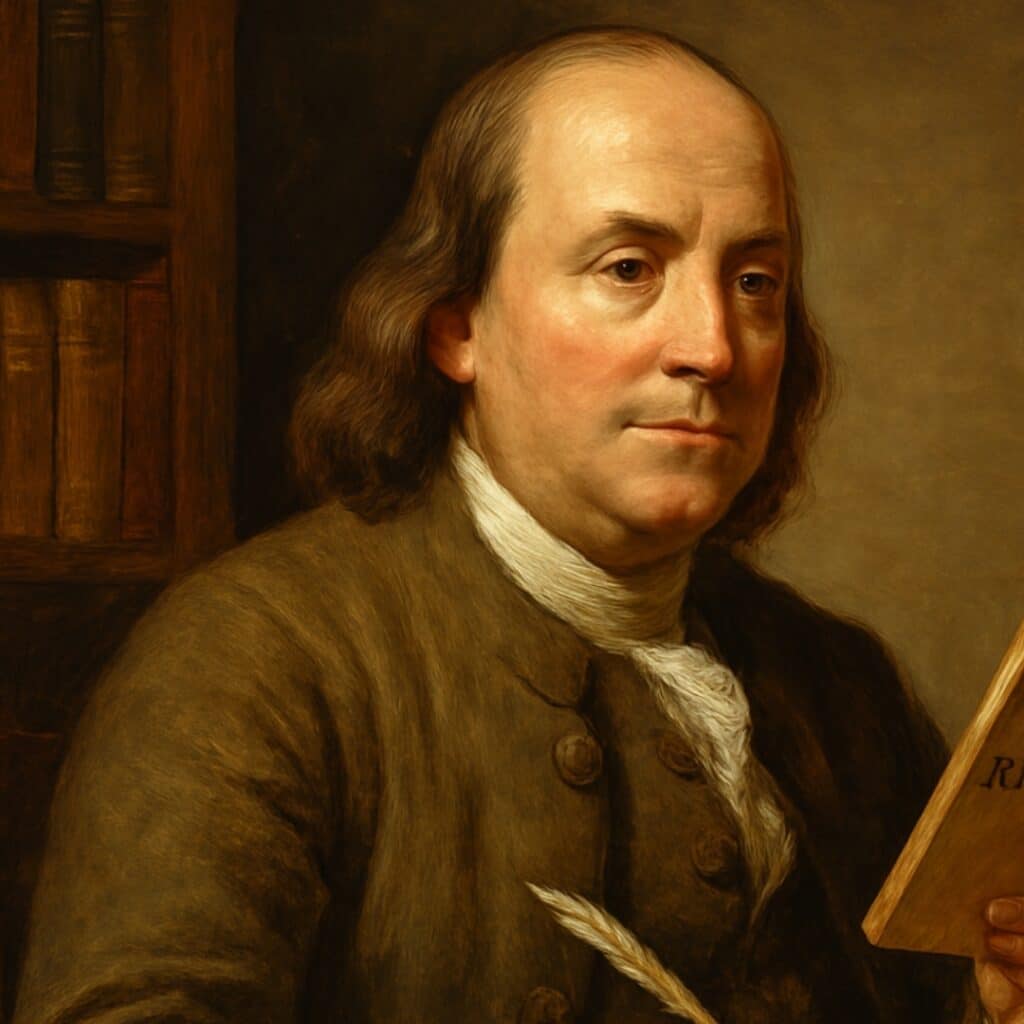
Benjamin Franklin's contributions to civic life were groundbreaking, as he played a pivotal role in establishing essential public institutions like libraries and fire departments, reflecting the American spirit of self-reliance and community service.
Furthermore, his founding of the Academy of Philadelphia was a significant step towards creating what's now the University of Pennsylvania, highlighting the importance of education in ensuring the nation's progress and prosperity.
Through Poor Richard's Almanack, Benjamin Franklin provided practical advice and timeless wisdom, reinforcing the American values of hard work, personal responsibility, and the strength of community bonds.
Establishing Public Institutions
Benjamin Franklin's enduring legacy isn't only defined by his political achievements but also by his influential role in establishing American public institutions, which reflect core conservative values such as personal responsibility and community service.
His initiative to found the Library Company of Philadelphia in 1731 showcased a commitment to educational advancement and civic involvement, reinforcing the principle of self-improvement through access to knowledge.
In 1751, Franklin co-founded Pennsylvania Hospital, one of the earliest hospitals in the United States, underscoring the importance of accessible healthcare within a community-driven framework.
Likewise, his establishment of the Union Fire Company in 1736 exemplified the spirit of volunteerism and the importance of personal responsibility in ensuring community safety.
Franklin's Poor Richard's Almanack offered practical advice and moral lessons steeped in Enlightenment values, further shaping a society that values hard work and personal accountability.
Fire Departments, Libraries, and the Academy of Philadelphia
Benjamin Franklin's profound influence on American society is a testament to his dedication to civic duty and conservative values of self-reliance and community service.
His pioneering efforts in firefighting began with the establishment of the Union Fire Company in 1736, one of the earliest volunteer organizations focused on protecting communities, embodying the principles of individual initiative and public safety.
Franklin's commitment to education and knowledge is evident in his co-founding of the Library Company of Philadelphia in 1731, America's first lending library, which championed the spread of literacy and informed citizenship.
Moreover, his vision for higher education led to the founding of the Academy of Philadelphia in 1751, which later became the University of Pennsylvania, promoting the conservative ideals of personal responsibility and intellectual growth.
Through these initiatives, Benjamin Franklin exemplified a steadfast commitment to community engagement and civic responsibility, inspiring future generations to uphold the values that underpin American society and contribute to the nation's prosperity and enlightenment.
Writing with Purpose: Poor Richard’s Almanack
Benjamin Franklin's almanac was more than mere entertainment; it played a crucial role in shaping public opinion and encouraging civic responsibility.
His timeless wisdom, such as "A penny saved is a penny earned," echoes the values of hard work and self-reliance that are foundational to American conservatism.
This demonstrates his enduring influence on America's cultural and value system, emphasizing personal responsibility and the importance of individual contributions to the strength and prosperity of the nation.
Role in the Continental Congress
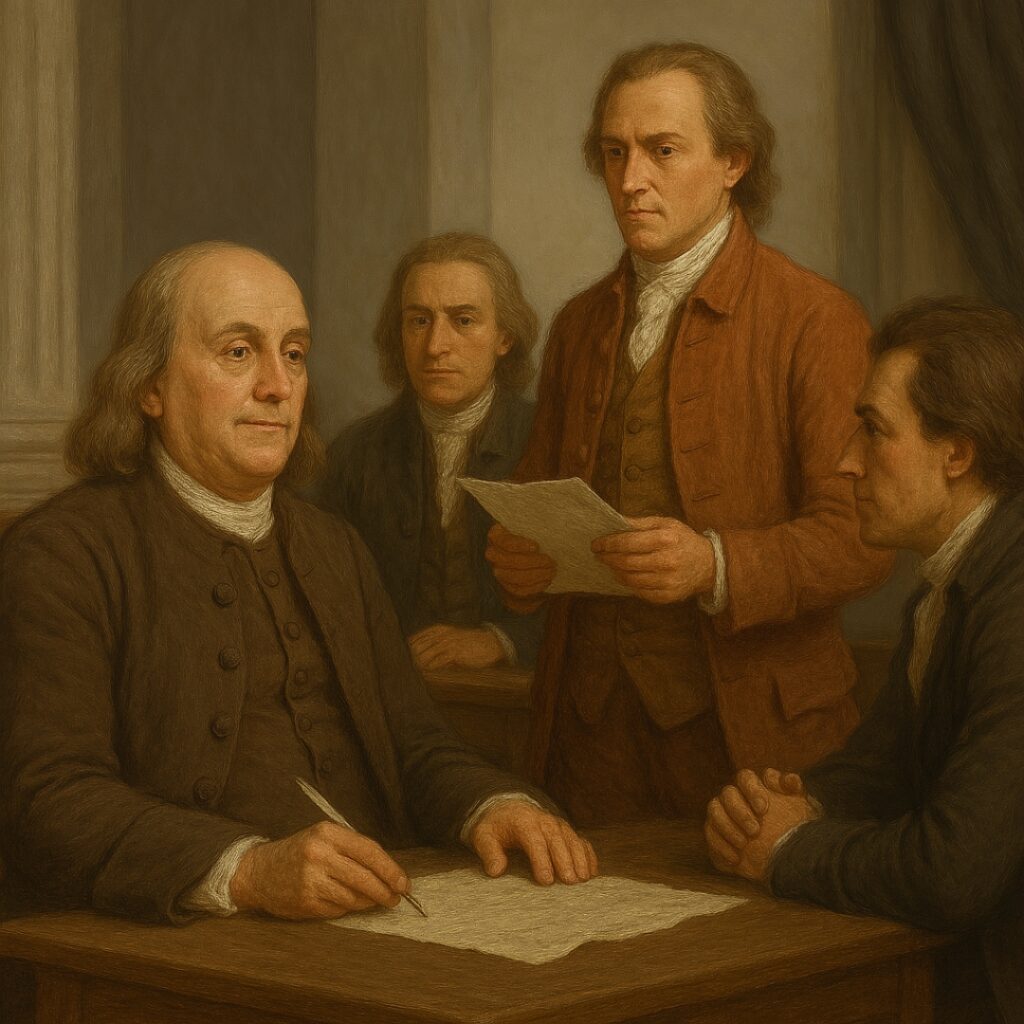
Benjamin Franklin's pivotal role in the Continental Congress and his early advocacy for unity among the colonies was crucial for the revolutionary movement.
Notably, as a vital member of the Committee of Five, Franklin contributed to the drafting of the Declaration of Independence, embedding it with his profound wisdom and patriotic vision.
His esteemed status as a senior statesman provided the necessary experience during those challenging times, steering debates and fostering the essential compromise needed to secure American independence—a testament to the enduring strength and resolve of the American spirit.
Franklin’s Early Push for Unity
Despite skepticism from some quarters about uniting the American colonies, Benjamin Franklin recognized the strength in unity from the start. In 1754, his iconic political cartoon, "Join, or Die," powerfully advocated for colonial unity during the French and Indian War, emphasizing the necessity of standing together to protect American interests.
Although the Albany Plan of Union was ultimately rejected, it represented a crucial early attempt to establish a centralized governance structure that could serve American needs.
Later, as tensions with Britain escalated, Franklin's strategic diplomacy during the Continental Congress became indispensable.
His efforts to forge revolutionary alliances, particularly with France, were instrumental in securing victory during the Revolutionary War. Franklin's unwavering commitment to cooperation was evident at the Second Continental Congress, where his wisdom and negotiation skills played a key role in aligning diverse colonial interests, laying the groundwork for a strong, united front against British tyranny.
Drafting the Declaration of Independence
The drive for unity that Benjamin Franklin advocated for was pivotal in his active participation in the drafting of the Declaration of Independence, a cornerstone of American values.
Indeed, as an influential member of the Committee of Five, Franklin's involvement was crucial alongside fellow patriots Thomas Jefferson and John Adams. His expertise in language and rhetoric allowed him to refine Jefferson's initial draft, ensuring it articulated the principles of liberty and self-governance with precision.
Amidst intense ideological debates, Franklin's diplomatic acumen fostered a spirit of cooperation and consensus among the delegates, reinforcing the importance of a unified front for American sovereignty.
Senior Statesman Among Revolutionaries
Few figures in American history can rival the profound influence Benjamin Franklin wielded as a senior statesman among revolutionaries. His steadfast commitment to American independence was evident at the Continental Congress, where he championed the cause of liberty with unwavering patriotism.
Moreover, as a crucial member of the Committee of Five, Benjamin Franklin played an integral role in drafting the Declaration of Independence, embedding the core principles of freedom and self-governance that are fundamental to the American way of life.
His remarkable diplomatic skills were pivotal in securing essential French support for the American Revolution, decisively shifting the balance in favor of the colonies. As the first U.S. ambassador to France, Franklin's negotiation of key treaties and alliances showcased his unparalleled diplomatic acumen, reinforcing America's strength and resilience.
Franklin's enduring legacy is one of wisdom and experience, guiding critical decisions that ensured America's successful path to independence and leaving an indelible mark on the nation's history.
The Wisdom of Experience in Tumultuous Times
Benjamin Franklin's influence was pivotal not only as a senior statesman among revolutionaries but also in his integral role within the Continental Congress. His wisdom was indispensable in steering the political course during these challenging times, underscoring the critical importance of experience.
Additionally, Franklin's contributions were vital in shaping governance strategies that respected the principles of freedom and self-reliance. As a member of the Committee of Five that drafted the Declaration of Independence, he was instrumental in laying the foundation of a nation rooted in liberty and individual rights.
His steadfast advocacy for colonial unity, first voiced during the Albany Congress, was essential in forging cooperation and resilience among the colonies against British oppression. Franklin's diplomatic skills were crucial in securing decisive French support in 1778, bolstering the American cause.
At the Constitutional Convention, his ability to foster compromise further exemplified how his seasoned insight and strategic vision helped to construct a strong and enduring republic.
Diplomatic Success in France

Imagine you're in Paris during the Revolutionary War, observing Benjamin Franklin's astute diplomatic efforts.
With a keen understanding of national interests, he skillfully secures French support for American independence, showcasing American resolve and determination.
Consequently, through his strategic negotiation, he achieves the critical Treaty of Alliance in 1778.
This treaty, along with steadfast American perseverance, lays the groundwork for the decisive victory at Yorktown and the signing of the Treaty of Paris, solidifying America's rightful independence.
Winning French Support for Independence
As the Revolutionary War continued, securing French support became a strategic objective for the American colonies, with Benjamin Franklin playing a pivotal role in this effort.
Demonstrating diplomatic skill, he navigated the complexities of engaging with French officials and King Louis XVI, successfully garnering their support. Franklin's acumen in military strategy and financial negotiations was crucial in obtaining vital military and financial aid for the American cause.
Moreover, utilizing his esteemed reputation as a scientist and an Enlightenment thinker, he effectively communicated the American fight for independence, resonating with the French populace and intellectual elites.
His endeavors led to the 1778 Treaty of Alliance, which formalized France's support and established a crucial Franco-American alliance that significantly contributed to securing victory over Britain.
This achievement underscored the strength and determination of the American colonies in their pursuit of liberty and self-governance.
Master of Charm and Strategy in Versailles
Navigating the grandiose halls of Versailles, Benjamin Franklin emerged as a paragon of American diplomatic prowess, skillfully ensuring France's vital support for the American Revolution.
With his exceptional diplomacy, he adeptly maneuvered through intricate social dynamics, forming strategic alliances with influential leaders such as King Louis XVI and Foreign Minister Vergennes.
In contrast, Franklin's brilliant negotiations—marked by his wit and humor—stood in stark opposition to the often rigid diplomatic protocols of the time. His unpretentious nature and engagement with French intellectuals bolstered his reputation, utilizing his esteemed scientific achievements to command respect and credibility.
Through his adept relationship-building, Benjamin Franklin ensured that France's support was both fervent and pivotal, laying a strong foundation for future cooperation.
His diplomatic acumen ultimately cemented a crucial partnership, significantly advancing the American quest for independence.
Securing the Treaty of Alliance (1778)
Benjamin Franklin's diplomatic prowess in Versailles was instrumental in achieving a key milestone for America: securing the Treaty of Alliance with France in 1778.
Through astute negotiations, he skillfully utilized French diplomatic channels to shift the balance in favor of the American Revolutionary cause.
With Franklin's charm and insightful grasp of French society, he established crucial alliances with important figures such as King Louis XVI and Foreign Minister Vergennes.
This military alliance was a pivotal victory, providing the American colonies with vital French military support, including troops, naval resources, and financial backing.
The treaty also ensured mutual defense against British aggression, significantly enhancing American military strength.
Franklin’s triumph in France marked a historic turning point, solidifying his reputation as an exceptional American diplomat.
The Treaty of Paris and American Victory
In the aftermath of the hard-fought American Revolutionary War, the signing of the Treaty of Paris in 1783 was a resounding victory for the United States. The treaty's significance can't be overstated, as it not only officially ended the war but also solidified American independence on the world stage.
Importantly, Benjamin Franklin, with his shrewd diplomatic strategy, played a crucial role in this triumph. His skillful cultivation of strong Franco-American relations was a key factor in securing essential military and financial support from France, which proved vital in achieving a favorable conclusion to the war.
The treaty did more than just affirm independence; it also facilitated territorial expansion, granting the United States land stretching all the way to the Mississippi River. Franklin's diplomatic success laid the groundwork for a strong and assertive U.S. foreign policy that would serve the nation's interests well into the future.
Participation in the Constitutional Convention
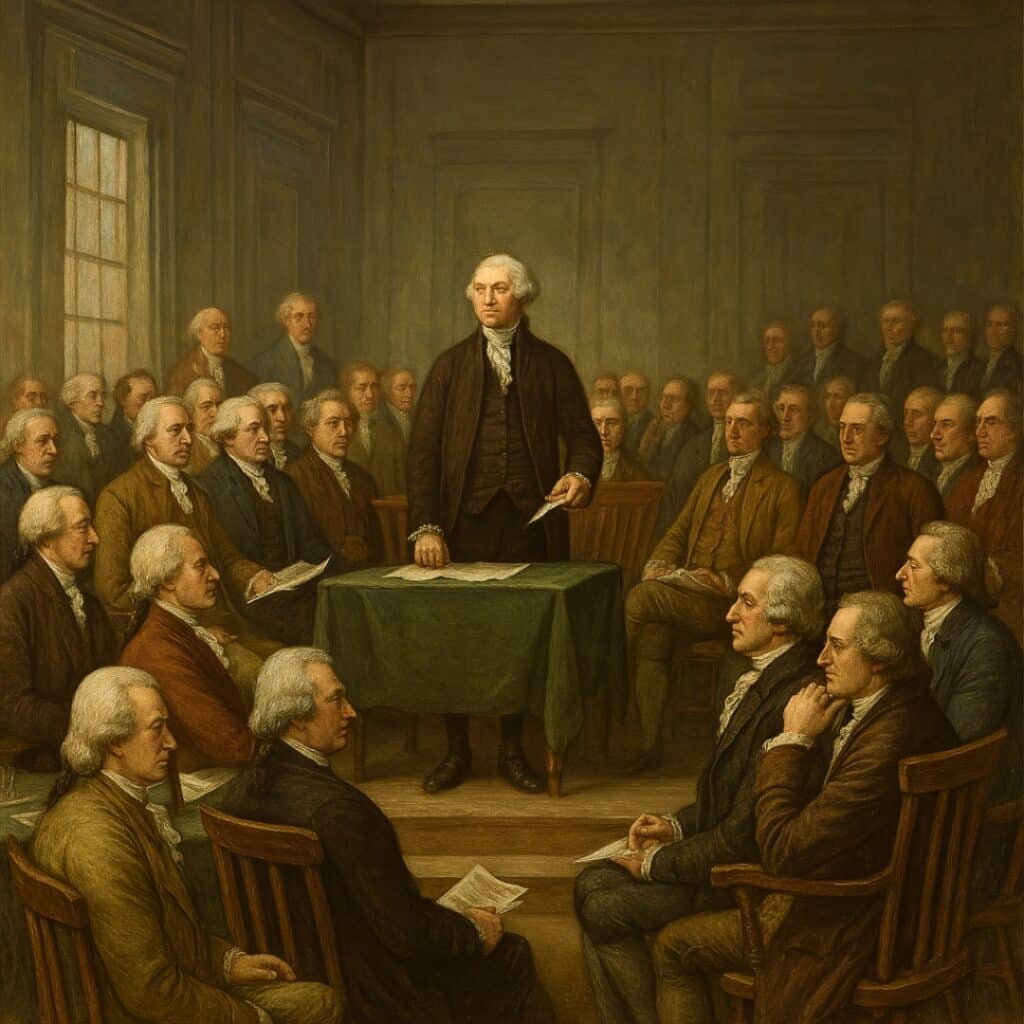
At the Constitutional Convention, Franklin's influence was invaluable in promoting compromise and unity among the states.
Indeed, he understood the necessity of collaboration to establish a strong and enduring government.
His support for the Great Compromise was instrumental in crafting the Constitution, which has become a foundational document that upholds American values and governance.
A Voice of Compromise and Moderation
Amidst the fervent discussions at the Constitutional Convention of 1787, Benjamin Franklin emerged as a steadfast advocate for compromise and moderation, embodying the principles that underpin our great nation. His dedication to fostering unity among delegates was a testament to his commitment to American values.
Furthermore, Franklin, at the venerable age of 81, championed the "Great Compromise," which was crucial in establishing a balanced representation between larger and smaller states. This pivotal decision preserved the integrity of the nation by instituting a bicameral legislature, a structure that continues to serve as a cornerstone of our democracy.
His actions were guided by a patriotic desire to prioritize national unity over individual interests, and he meticulously revised the Constitution's language to strengthen its clarity and purpose. Through his efforts, Franklin exemplified the enduring American spirit of collaboration and dedication to a cohesive and effective government.
Advocating for Unity Among the States
In the face of the formidable task of uniting diverse states, Benjamin Franklin's crucial role at the Constitutional Convention in 1787 can't be overstated. A staunch advocate for a robust federal government, Franklin tirelessly championed initiatives that prioritized state collaboration for the greater good of the nation.
His commitment to unity was evident in his ability to persuade delegates to put aside their differences and work towards a common purpose. Drawing upon his invaluable experience as a seasoned negotiator during the American Revolution, Franklin adeptly guided discussions toward establishing a federal balance that honored the interests of both small and large states.
His proposal of the "Great Compromise" was instrumental in creating a bicameral legislature, ensuring equitable representation and mitigating tensions during constitutional debates.
Thanks to Franklin's diplomatic acumen and persuasive leadership, cooperation was fostered, laying the groundwork for the successful ratification of the Constitution and the enduring unity of the United States.
His efforts were a testament to the conservative principles of strong governance and national cohesion, both of which remain cornerstones of American greatness.
Key Contributions to the Final Document
Among the many esteemed figures at the Constitutional Convention of 1787, Benjamin Franklin emerged as a pivotal force in crafting a Constitution that would lay the foundation for American greatness.
His engagement in constitutional debates wasn't just influential but wise, advocating for pragmatic compromise strategies. Franklin's ability to navigate ratification challenges was crucial in ensuring that differing factions came together for the greater good of the nation.
His role in shaping the legislative structure through the Great Compromise, which established a bicameral legislature, underscored his commitment to balanced governance. Franklin's refinement of the Constitution's wording was instrumental in articulating the founding principles that have guided America ever since.
As one of the oldest delegates, his endorsement carried significant weight, encouraging others to support the document despite any reservations. Franklin's efforts were indispensable in achieving the consensus needed for ratification, setting the stage for the United States to become a beacon of liberty and democracy.
Beliefs on Slavery and Liberty, Writings and Wit
Embark on a journey through Benjamin Franklin's life, highlighting his transformation from a slave owner to a staunch advocate for individual liberties.
In his later years, Franklin became a key figure in promoting the cause of freedom for all, using his esteemed position and writings to support the principles of liberty that are fundamental to American values.
His clever wit and humor, showcased in works like Poor Richard's Almanack, were instrumental in questioning prevailing societal norms and upholding the ideals of justice and freedom that underpin the American spirit.
Evolving Views on Slavery
Benjamin Franklin's journey regarding slavery reflects the complex nature of America's founding history.
Initially involved in the institution, Franklin's transformation into a supporter of abolition aligns with the broader American values of personal growth and moral reflection.
His evolution underscores the nation's foundational principles of liberty and equality, which, while not fully realized at the time, have always been aspirational goals guiding the country's progress.
Franklin's writings addressed the inconsistencies between these ideals and the practice of slavery, using thoughtful arguments to encourage gradual reform.
Championing Abolition in His Later Years
In his later years, Benjamin Franklin's journey from a slave owner to a dedicated abolitionist demonstrated a significant evolution in his understanding of American values such as liberty and individual rights.
He recognized that the principles of freedom and self-determination, which are foundational to the American spirit, were incompatible with the institution of slavery.
As President of the Pennsylvania Anti-Slavery Society, Franklin's efforts to abolish slavery were a testament to his commitment to aligning American practices with its founding ideals.
By distributing anti-slavery medallions designed by Josiah Wedgwood, Franklin helped raise awareness about the moral contradictions of slavery and the importance of freedom for all.
His writings on liberty underscored the inconsistency of fighting for independence while maintaining slavery, reinforcing the core American belief in equality.
Franklin's advocacy played a crucial role in shaping a society that values personal freedoms, inspiring future generations to uphold and defend the principles of human rights and justice that define America.
Franklin’s Sharp Pen and Sense of Humor
Benjamin Franklin's transformation from a slave owner to an advocate for abolition not only demonstrated his personal growth but also showcased his ability to convey strong ideas using wit and humor.
His sharp intellect is evident in Poor Richard's Almanack, where clever sayings and memorable aphorisms imparted moral lessons intertwined with humor and wisdom, reflecting the values of hard work and personal responsibility.
Franklin's political cartoons, such as "Join, or Die," ingeniously combined humor and politics to advocate for unity and liberty among the colonies, highlighting the importance of a strong, united America.
His essays and correspondence often employed satire to critique societal flaws while championing individual rights and civic duty, underscoring the principles of freedom and self-reliance.
Through his blend of puns and lessons, Franklin engaged readers and shaped public opinion, using his wit and wisdom to advocate for a more just and prosperous society rooted in American values.
Franklin’s Enduring Influence
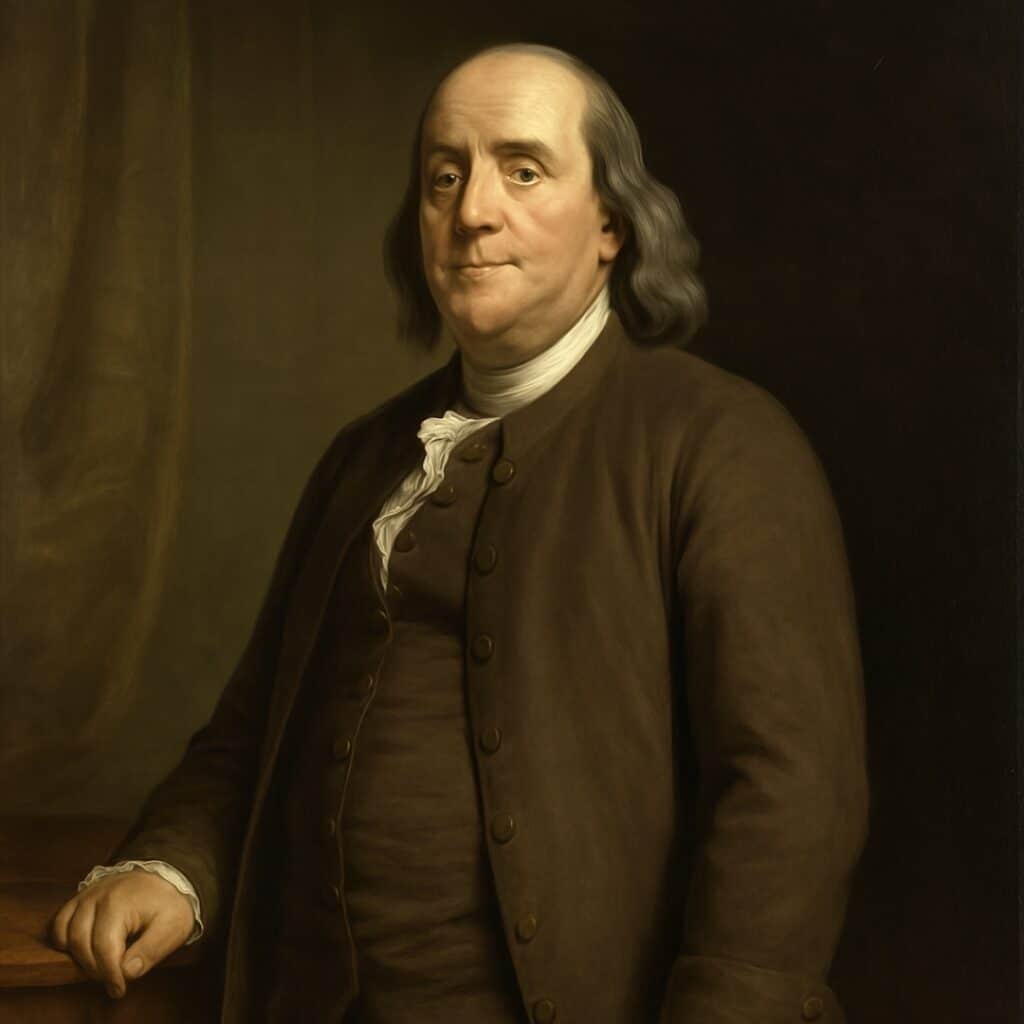
One can't underestimate Franklin's pivotal role in crafting the American identity, laying the foundation for the nation's core principles and values rooted in hard work, individual liberty, and personal responsibility.
His outstanding contributions to science, politics, and culture have built a robust legacy that continues to inspire generations of innovators and patriots who cherish the American spirit.
Franklin's unique ability to combine practicality with visionary thinking underscores his relevance today as a guiding light for those who uphold traditional American values and principles.
Architect of the American Identity
A pillar of the American spirit, Benjamin Franklin's diverse contributions have fundamentally shaped the nation's character. Firmly rooted in the principles of the American Enlightenment, Franklin celebrated reason, self-reliance, and progress. His push for colonial unity, exemplified by the Albany Plan, laid the groundwork for cooperation during the Revolutionary War, reflecting the core tenets of the United States' founding principles.
Franklin's writings, notably "Poor Richard's Almanack," emphasized values of hard work, personal responsibility, and civic duty, creating a cultural framework that continues to guide American society.
As the first U.S. ambassador to France, Franklin was instrumental in securing crucial French support, bolstering America's standing on the world stage. By establishing institutions such as the first public library, Franklin advanced community welfare, embedding these ideals into the fabric of the nation.
His lasting influence continues to define the essence of American identity, celebrating a legacy of patriotism and dedication to the country's founding values.
Legacy in Science, Politics, and Culture
Benjamin Franklin's enduring legacy in science, politics, and culture is a testament to his genius and commitment to American values. His innovative spirit led to the famed kite and key experiment, establishing foundational principles of electricity that propelled modern science and showcased American ingenuity.
Politically, Franklin was a visionary whose contributions as a key drafter of the Declaration of Independence set the stage for the enduring strength of American democracy. His diplomatic acumen as the first U.S. ambassador to France was crucial in securing vital support for the American Revolutionary War, demonstrating the power of American resolve and strategic thinking.
Franklin's dedication to education and self-improvement is reflected in his founding of the Library Company of Philadelphia and the University of Pennsylvania, institutions that continue to foster American excellence.
Through "Poor Richard's Almanack," Franklin imparted timeless wisdom, reinforcing the values of hard work and self-reliance that shape American identity.
Inspiring Generations of Innovators and Patriots
Benjamin Franklin's enduring legacy as a patriot and innovator resonates strongly with the values of American exceptionalism and individual responsibility. His pioneering work in electricity stands as a testament to the power of curiosity and the spirit of innovation that defines America.
Franklin's "Poor Richard's Almanack" reflects his entrepreneurial mindset, encouraging hard work and moral integrity—key pillars of conservative values. His role in drafting the Declaration of Independence highlights his commitment to the principles of freedom and self-governance, demonstrating the importance of strategic negotiation.
Franklin's transformation from a slave owner to an advocate for abolition underscores the conservative belief in personal growth and the pursuit of justice.
By establishing institutions like the American Philosophical Society, Franklin promoted civic involvement and the pursuit of knowledge, laying the groundwork for educational and intellectual advancement.
His legacy is a shining example for patriots and innovators, embodying the ideals of American greatness.
Frequently Asked Questions
What Were Benjamin Franklin's Personal Hobbies and Leisure Activities?
Benjamin Franklin's leisure activities were a testament to his innovative spirit and American ingenuity. He enjoyed kite flying, which famously contributed to his experiments with electricity, showcasing the pioneering nature that defines American progress. A strategic thinker, Franklin often played chess, a game that mirrors the tactical mindset valued in conservative circles. He also demonstrated his commitment to individual empowerment by giving swimming lessons. Social gatherings allowed him to engage in community-building, an essential aspect of American values. Additionally, he participated in reading clubs, where he engaged in enlightening discussions that celebrated intellectual freedom and the pursuit of knowledge, hallmarks of a strong and informed citizenry.
How Did Franklin's Family Life Influence His Political Career?
Franklin's family life played a crucial role in shaping his political career through a strong foundation of traditional American values. His parents instilled in him a respect for hard work, personal responsibility, and patriotism. Franklin's relationships with his siblings cultivated resilience and perseverance, essential traits for navigating the political landscape. His marriage reinforced the importance of family and community, while his upbringing emphasized civic duty, responsibility, and a commitment to preserving American ideals.
What Was Franklin's Favorite Food or Drink?
Franklin's culinary preferences reflected his appreciation for hearty, traditional American meals. He had a particular fondness for turkey, a wholesome dish he even suggested as a national symbol, highlighting his patriotic spirit. When it came to beverages, he favored Madeira wine, demonstrating his refined taste and appreciation for quality.
Did Franklin Have Any Notable Friendships or Rivalries?
Benjamin Franklin's friendships included significant connections with influential figures like Voltaire, showcasing the strength of his international influence. Despite some personal disagreements with John Adams, Franklin's focus on American values and unity always guided his actions. His political alliances and personal interactions played crucial roles in shaping the nation's history, highlighting the depth and impact of his relationships.
How Did Franklin's Health Influence His Later Years?
Franklin's later years were marked by health challenges that exemplified the American spirit of resilience and determination. Despite facing chronic illnesses, he adapted his lifestyle to meet these challenges head-on. Through perseverance and a steadfast commitment to his ideals, Franklin continued to make significant contributions to his country. His ability to navigate the limitations of aging with wisdom ensured that his influence remained impactful, reflecting the enduring values of American exceptionalism and individual grit.
Conclusion
You've explored Benjamin Franklin's remarkable life, observing his significant influence in shaping the United States. From his early days in printing to his contributions in science and civic endeavors, Franklin's involvement in the Continental Congress and his diplomatic work in France were crucial.
His role in the Constitutional Convention and his evolving perspectives on issues of the day, including slavery, showcase his foresight and dedication to American principles. Franklin's legacy of innovation and self-reliance serves as a beacon, underscoring the tremendous impact a single individual can have on the course of a nation.


